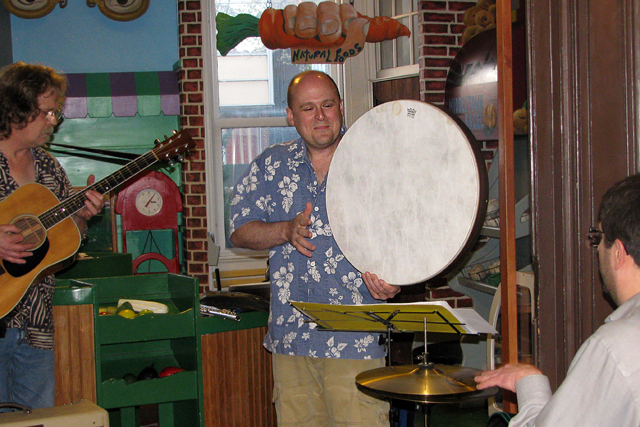Joseph Getter: Educator, Instrumentalist, Ph.D Candidate in Ethnomusicology

Q: Joseph, you are a Ph.D candidate in ethnomusicology. How many years have you been at Wesleyan and when will you finish your Ph.D?
A: I began my graduate studies in ethnomusicology at Wesleyan in the M.A. program in 1995, and don’t you know you’re not supposed to ask when the dissertation will be done? I’m anticipating finishing this summer.
Q: What are you studying, specifically?
A: I have done fieldwork in Chennai, India, on the film music industry there. It’s a huge musical, social, and economic phenomenon that is under-studied in academia. I hope that my dissertation will be a contribution to understanding popular music in South Asia. I’ve also studied classical South Indian flute and Javanese gamelan at Wesleyan.
Q: What are your thoughts on Wesleyan’s ethnomusicology program?
A: It’s a fantastic program that integrates the study of scholarly literature with learning to perform music traditions from around the world. In seminars with Mark Slobin and Su Zheng, I learned about how to conduct research, and think, write and speak about musical cultures. The graduate student population is very talented, diverse, and supportive of one another; it’s a great community. We also benefit from the presence of the music composition program, as well as the top-notch liberal arts environment. So, Wesleyan’s ethnomusicology program is pretty amazing and unique. I would like to continue to research, study, teach and perform world music, and the Ph.D. program is a great way to focus one’s career on that.
Q: Where did you receive your bachelor’s degree, and for how many years have you been interested in music?
A: I have a B.A. in Religion from Oberlin College, where I got started in world music by learning the West African kora (a harp-lute), North Indian singing, and gamelan. I’ve been a musician since middle school, when I started playing clarinet. I knew pretty early on that I wanted to be in music.
Q: What instruments do you play? Who has influenced you here at Wesleyan?
A: This may take a while to answer! I’d say that my musical personality has been deeply shaped by my experiences at Wesleyan. The professors here teach not just how to play the notes, but rather they impart a vision of what music is all about. I perform on percussion, electronics, and woodwinds. Just this year, I began to study the Western silver flute with Wesleyan private lessons instructor Peter Standaart, who is a master teacher. I’ve been learning traditional gamelan music from faculty members I.M Harjito and Sumarsam since I started here. I also attend the group classes in South Indian vocal music taught here by B. Balasubrahmanian. My guru in Indian music is the late T. Viswanathan (Wesleyan Ph.D. 1975), who taught here from 1975 until he died in 2002. Finally, I’ve picked up a lot of ideas from the composers here, professors Anthony Braxton, Alvin Lucier and Ron Kuivila. In all of these musical areas, I feel a connection to the traditions that inform present-day practices with which I’m involved, whether that be temple arts from Tamil Nadu, or John Cage’s experimental music from the United States.
Q: Do you write and perform your own music?
A: Yes. I like to improvise as well as create music for dance and theater productions. I got started working with dancers as an accompanist for modern dance classes in Wesleyan’s Dance Department, a job I still hold. Just recently, I performed at Charter Oak Cultural Center in Hartford, as a live musician onstage with the DancEnlight modern dance company. We worked together to create a musical score to fit their dance, and it was a great chance to apply many of the musical ideas I’ve learned from my studies at Wesleyan.
Q: Where are you from?
A: Wesleyan brought me to this area after growing up in the Midwest and South. Middletown is a great community and a lovely place to live.
Q: What organizations are you involved with in the area?
A: I direct the Youth Gamelan at Wesleyan, which is open to all children in the area; Wesleyan’s Center for the Arts oversees this ensemble, and we are very pleased that it just received funding from the Middletown Commission on the Arts. I give woodwinds lessons at the Green Street Arts Center, and for the past five years I’ve been teaching music and technology courses at the Independent Day School Summer Camp. I am involved with the Art Farm theater company as music director for their summer Shakespeare production at Middlesex Community College. I’ve also been music director at Oddfellows Playhouse. Right now, I’m working there on The Oresteia, which opens at the end of April. I’ve played sax in the band for the Oddfellows Children’s Circus every year since 1997; it’s the first firm date that I add to my calendar each year! I also help produce concerts of Indian classical music at the Connecticut Valley Hindu Temple Society, the Hindu temple on Training Hill Road in town. Finally, I work through the Center for the Arts as the editor of Silent Sounds, the literary publication of the Middletown Public Schools. It features the best writing of middle and high-school students, and also includes a reading on May 4 in the World Music Hall.
Q: What are your hobbies/interests?
A: Well, music is a full-time obsession, but I also have a family that is very important to me. My wife Kate Wolfe works in Olin Library, and we are raising two children who attend Middletown Public Schools. We all appreciate that there are many good restaurants here, though the kids usually want to go for pizza, for which there are excellent options in town. We also like to hike. There are several great hiking trails right in Middletown.

